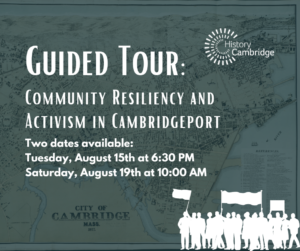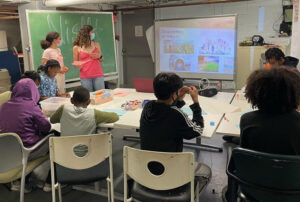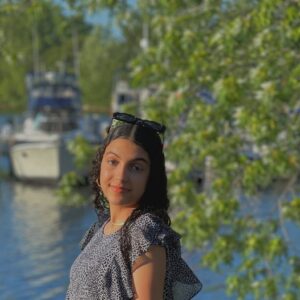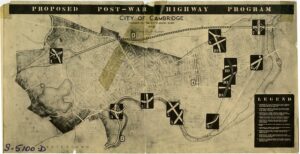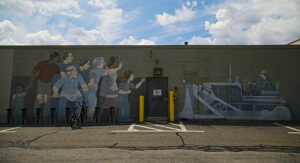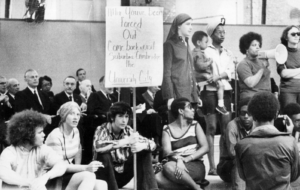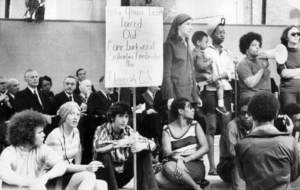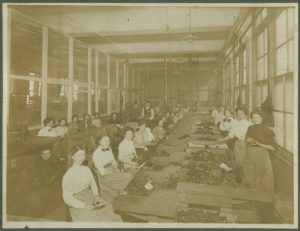Posts Tagged ‘Activism’
Sat, August 19 Guided Tour: Community Resiliency and Activism in Cambridgeport Option 2
On August 15 and 19, History Cambridge intern Miranda Santiago led two sessions of a tour she created on Community Resiliency and Activism in Cambridgeport. Born and raised in Cambridge, Miranda is now a student at New York University, but her experiences growing up in Cambridge – in particular the time she has spent in…
Read MoreTues, August 15 Guided Tour: Community Resiliency and Activism in Cambridgeport Option 1
Join History Cambridge and Miranda Santiago for a tour of Cambridgeport on August 15th or 19th.
Read MoreYouth-led social justice movements lead the way in Cambridge around issues of race and climate
The goal for my History Cambridge fellowship, starting in February, was to connect the history of the city with issues affecting its teenage and young-adult residents, raising awareness and promoting action. As my fellowship comes to a close, I’ve learned a lot from teens around Cambridge that has changed my perspective and added to my understanding of various topics and experiences.
Read MoreTeens will spotlight neighborhood features thorough a project by CRLS’ Jennat Jounaidi
My name is Jennat Jounaidi, a 10th-grader at Cambridge Rindge and Latin School who has lived in Cambridge all my life, and I am elated to be this year’s History Cambridge fellow. My interests include history and politics (and, in my free time, cooking and baking), and the goal for this semester is to help connect the history of Cambridge with issues affecting the city’s teenage and young adult residents.
Read More2012 Inner Belt Symposia
In 2012, the Cambridge Historical Society held a three-part symposia on the Inner Belt in Cambridge. The events were co-sponsored by MIT, Livable Streets, and the Lincoln Institute of Land Policy and were underwritten by Irving House and Forest City. The planning committee included Karilyn Crockett, Richard Garver, Michael Kenney, Gavin Kleespies, Alyssa Pacy, and Jim Peters. Program One: The Role of…
Read MoreInner Belt Hub
Cambridge had a major role in battling one highway for decades and eventually sparking a process that created a powerful coalition that led officials to remake transportation policy for the Boston area inside Route 128
Read MoreBlack History in Cambridge: Online Resources Hub
Above Image: Saundra Graham speaks into a megaphone during the occupation of 319th Harvard Commencement June 11, 1970 (Courtesy Cambridge Historical Commission) Delve into these online resources that explore Black history in Cambridge. More programs and events about Cambridge’s Black history are being planned. To be notified, sign up for our monthly enewsletter. Articles Self-Guided…
Read MoreSelf-Guided Tour: Women Activists of Riverside 50 Years After Suffrage
Stop 1: Begin the tour in Central Square With the passage of the 19th Amendment one hundred years ago this past August (2020), American women won the right to vote. Rather than a culmination, this event marked the beginning of a long fight for equal treatment and equity that is still far from over. Fifty…
Read More“The Absolute Majority of the Population”: Women in Twentieth-Century Cambridge
This article was originally published as a chapter in Cambridge in the Twentieth Century, edited by Daphne Abeel, Cambridge Historical Society, 2007. Inspired by Cambridge Historical Society’s 2020 theme—Who are Cambridge Women?—the author, Eva Moseley, has reviewed the manuscript and made a few updates which are noted in the text that follows. “The Absolute Majority…
Read MoreYWCA of Cambridge: Labor Activism in the 1890s-1930s
By Sarah Huggins, Intern, Lesley UniversityMarch 2020 The YWCA of Cambridge established itself as self-governing in 1891 with a simple mission, “To improve the temporal, moral and religious welfare of those who come under its care, by personal influence and by industrial and educational classes.” The organization operated with liberal policies for their era in…
Read More
